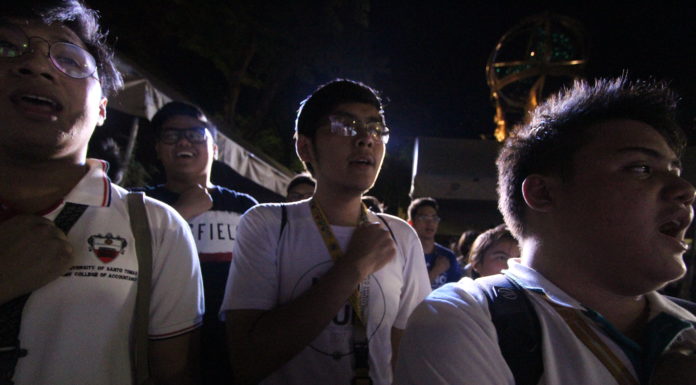SCIENTISTS and intellectuals need to build bridges toward peace, Prof. David Jonathan Gross, a 2004 Nobel Prize Winner for Physics said.
Gross was in Manila recently to deliver lectures as part of a wider lecture series known as Bridges: Dialogues Towards a Culture of Peace, sponsored by the International Peace Foundation (IPF), which aims to foster peace through education.
With Bridges, IPF endeavors to limit the gap between the knowledge of Physics, Chemistry, Economics, Literature, and Medicine in the western world and that of the Philippines and Asia. It is a Vienna-based non-political and non-religious organization that seeks to promote humanitarian support through independent platforms and programs which aim to bring the different Nobel Prize winners for medicine, physics, and other related disciplines to give lectures in different universities in the Philippines and Thailand.
Last January 10, Thomasians got a chance to interact with Gross in a dinner hosted by the University at the Dusit Hotel Nikko in Makati. The dinner was part of the University’s participation in Bridges.
Different University administrators attended the dinner, such as Prof. Clarita Carillo, vice-rector for academic affairs, Dr. Graciela Gonzaga and Fr. Winston Cabading, O.P., dean and regent of the Faculty of Medicine and Surgery, and Prof. Fortunato Sevilla, dean of the College of Science. Also in the dinner was Dr. Celia Anatalio, who founded medical physics in the country.
Education and peace
According to Uwe Morawetz, founding chairman of IPF, Bridges, which was first held in Thailand, is an IPF peace summit program that brings different Nobel laureates to Asian countries to deliver lectures for the “promotion” of peace.
“We also aim to build connections between the institutions where the Nobel laureates came, from such as Harvard University, Princeton University, and the University of California, and the institutions here in the Philippines,” he added.
“The IPF believes that the basis for peace is education. When a particular person acquired enough knowledge and enough education, he will be equipped with the values of professionalism and be concerned with promoting the development in his own society,”
“The Nobel laureate were chosen based on their contributions to helping to solve the social problems of the world at present. Professor Gross is one of them. He has involved himself in dealing with social issues, thinking beyond his research and trying to connect his knowledge to other areas of the society,” Morawetz said.
Gross said that educating people can help them realize that they have something in common.
“Science can solve some important problems that the whole world faces and has to solve together,” he explained. “An example is informing people of their common origin. Biology and genetics have now proven that we all have a common origin in Africa 150 thousand years ago. We’re all related. We’re all cousins.”
In his lectures at the University of the Philippines in Quezon City, De La Salle University in Manila, and University of San Carlos in Cebu, Gross discussed new knowledge on elementary particle physics, or the study of the smallest constituents of matter called quarks. He also talked about the state of the Superstring Theory, a hypothesis which aims to explain that all particles and basic forces that govern nature is modeled with tiny vibrations known as supersymmetric strings.
In the dinner with UST, Gross, who came from University of California, expressed his desire to return in time for UST’s Quadricentennial celebration.
“I remember a fellow countryman who said ‘I shall return’,” he said, alluding to American Gen. Douglas McArthur’s promise to come back to the Philippines during the Second World War.
Asymptomatic freedom
Gross is the director and holder of the Frederick Gluck Chair in Theoretical Physics at the Kavli Institute for Theoretical Physics of the University of California in Santa Barbara. Together with H. David Politzer and Frank Wilczk, he was awarded the Nobel Prize for Physics for their Quantum Chromodynamics (QCD) theory.
QCD, a new physical theory, describes the strong force, the force that can be found in the nucleus of atoms. The theory offers an explanation on why quarks, subatomic particles that make up protons and neutrons, behave as free particles in extremely high energies.
This is characterized by a phenomenon that the Nobel winners discovered. The phenomenon is now known as asymptotic freedom. According to the theory when quarks are brought farther apart, the strong force that brings them together becomes stronger. However, when the distance between the quarks is decreased, the strong force among the subatomic particles becomes weaker.
According to Gross, he decided to conduct the study in order to answer the difficult question of how the strong force that acts in the center of atoms inside the nucleus works.
His theory is now widely accepted as the best explanation on how the universe works.
”It will benefit mankind in understanding how one of the basic forces of nature works,” he told the Varsitarian.
Aside from Gross, other Nobel Laureates will be coming to the University to give speeches and dialogues under the Bridges program. Prof. David Baltimore, Nobel Laureate for Medicine in 1975 will be coming on March 26 while Prof. Aaron Ciechanover, Nobel Laureate for Chemistry in 2004, will be coming on April 7.













